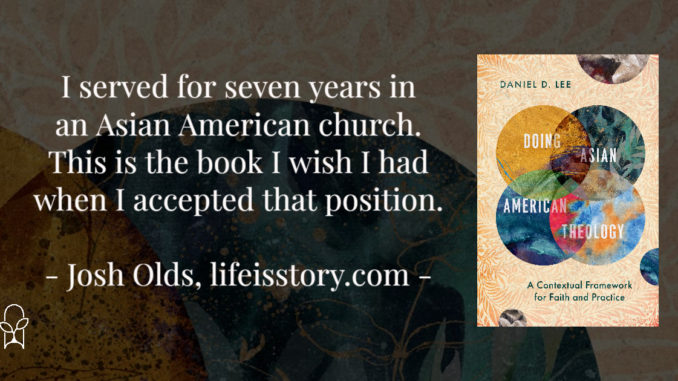
Published by IVP Academic on November 29, 2022
Genres: Academic, Non-Fiction, Theology
Buy on Amazon
Goodreads

Asian American theology is about God revealed in Jesus Christ in covenantal relationship with Asian Americans qua Asian Americans. Thus, Asian American theology is about Asian Americans as well, as human covenant partners alongside of God.
In doing Asian American theology, Daniel D. Lee focuses on Asian American identity and its relationship to faith and theology, providing a vocabulary and grammar, and laying out a methodology for Asian American theologies in their ethnic, generational, and regional differences. Lee's framework for Asian American theological contextuality proposes an Asian American quadrilateral of the intersection of Asian heritage, migration experience, American culture, and racialization. This methodology incorporates the need for personal integration and communal journey, especially in the work of Asian American ministry. With interdisciplinary insights from interpersonal neurobiology and trauma theory, he offers a process of integration and reconciliation for Asian American theologies in service of Asian American communities of every kind.
I grew up in a majority white, rural small town in Indiana. When I graduated from seminary, I took a youth pastor position at a primarily Asian-American church that had more Asian-Americans in the church than there was in my entire hometown. Doing Asian American Theology is the book I wish I’d had when I accepted that position. Dr. David D. Lee is the academic dean for the Center for Asian American Theology and Ministry and the assistant professor of theology and Asian American studies at Fuller.
As such, Lee’s experience with Asian American theology and the Asian American church is based in both expertise and experience. He writes about his own struggle with ethnic identity and with wanting to go away from, then feeling called back to, the Asian American church. While a lot of Doing Asian American Theology stays in the realm of methodology without much of a focus on practical implementation, Lee’s experience provides a personal and practical perspective amid the theoretical. My one criticism of the book is that I would have liked to have seen more practical suggestions for developing an Asian-American theology that resists assimilation and honors ethnic heritage and culture. However, as an academic title, I also realize that wasn’t entirely its purpose. Perhaps a follow-up volume emphasizing strategies for implementation could follow this foundational work?
Lee has developed and Doing Asian American Theology works from a protocol called the Asian American Quadrilateral. This protocol highlights four aspects of the Asian American experience: dealing with Asian heritage, the experience of migration and loss, navigating American culture and representation, and societal racialization. Lee makes the argument that these aspects of being Asian American necessitate Asian Americans do theology (and thus approach God) in a distinctly Asian American way. The pushback to this, of course, is that God transcends ethnic boundaries (a key element of the Book of Acts); however, in American theology the approach to God is often distinctly White. Because whiteness has been normalized as the “default” in American culture, this is not often obvious to majority culture audiences. While God does transcend ethnic boundaries, people from different ethnic backgrounds come to God and experience God in different ways (also a key element of the Book of Acts).
The most salient part of the book in my experience was Lee’s discussion of how many Asian American churches struggle with their Asian identity and determining how much of their “Christian culture” is actually *American* Christian culture. Asian Americans have a unique place in America’s migration story and are more likely to feel the need to assimilate into majority culture. I think this is especially true for Asian American Christians, whose cultural experience of Christianity is usually first based on majority-white expressions of Christianity. Doing Asian American Theology encourages Asian Americans to not put aside their Asian-ness or ignore their cultural heritage to worship Jesus.
Another important point of the book is that, even when minority groups are given a voice, it is usually the most privileged and prominent within the group that are heard. Thus, Asian-American theology can run the risk of being Chinese or Korean—the two largest Asian American Christian contexts—but still leave out other Asian minority groups. While no culture is a monolith, Asia in particular has a mass of languages, backgrounds, and cultures and migrant populations in particular vary differently in terms of migratory purpose and socio-economic position.
If you are involved in Asian-American ministry, Doing Asian American Theology is a wonderful resource that might contextualize some of what you are seeing in your church. Asian American Christians must not be afraid of experiencing God as Asian Americans. Lee offers liberation from assimilation and a methodology for making Christianity an integral part of the Asian American experience that speaks to that experience and context.
